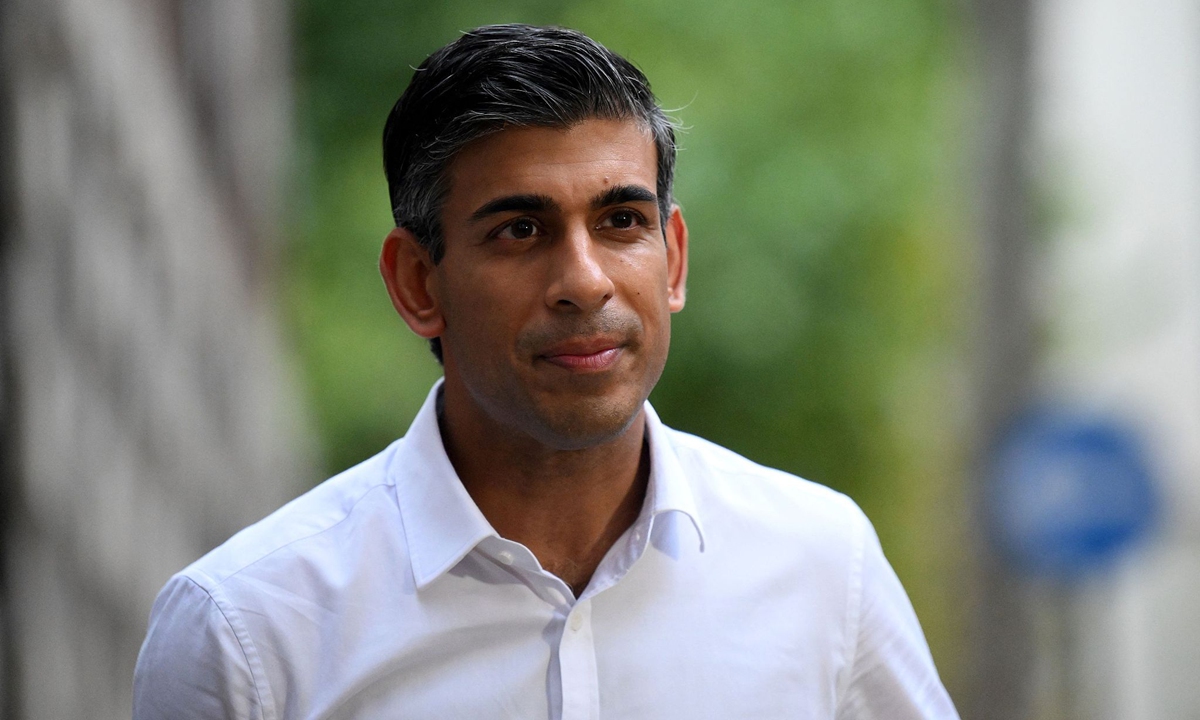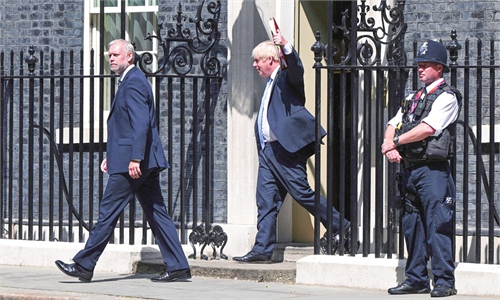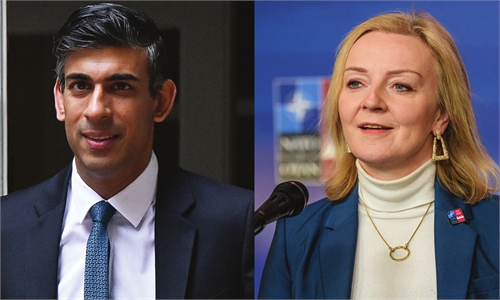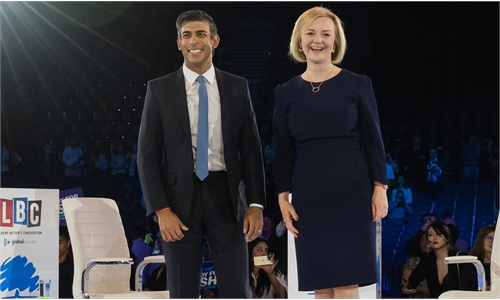
Rishi Sunak. Photo: VCG
Rishi Sunak will become the UK's next prime minister as he won the race on Monday to replace Liz Truss as Conservative Party leader, and after former leader Boris Johnson pulled out of the race on Sunday.
Chinese experts hold a cautious attitude on the future after Britain's former finance minister is set to become the next UK prime minister, especially on whether he will be able to lead the country out of its economic mess. Though Sunak is believed to hold a more pragmatic view compared to his predecessor, it's unlikely that he will be able to fix the country's structural problems overnight, some experts said.
Unlike Truss and Johnson, Sunak, with a background in finance and economy, is expected to make it a priority to handle domestic issues in a stable manner, which means that he may avoid the aggressive rhetoric that Truss adopted, and there won't be any significant shift in his upcoming policies in dealing with either Russia or China, according to some experts. However, facing a highly divided party, Sunak needs to first stabilize his governance as his legitimacy could be challenged again, leading to another shift in power.
Sunak has become the new Conservative leader and will be prime minister after Penny Mordaunt followed Boris Johnson in withdrawing from the running, minutes before the party was due to announce how many MPs had backed each candidate, the Guardian reported.
Sunak emerged as the frontrunner in the race to become Britain's next prime minister, receiving nearly 150 endorsements from Conservative lawmakers, according to media reports.
The Conservative Party hastily ordered a contest after Truss announced her resignation on Thursday, becoming the shortest-serving prime minister in British history following her failed tax-cutting plan. The dramatic resignation rocked the British political scene, which some Chinese experts called a microcosm of failing Western politics.
But some Chinese experts have doubts that a pragmatic candidate with a professional background taking the lead will solve the UK's problems.
Sunak's expertise and past experiences have also raised some hopes for tackling inflation and the energy crisis, but Britain is currently seeing a growing domestic dilemma which won't be solved regardless of who moves into 10 Downing Street, Cui Hongjian, director of the Department of European Studies at the China Institute of International Studies, told the Global Times on Monday. "With Truss making mistakes in her tax-cutting plans, the Tories' reputation has also been damaged. Rebalancing policy will be a challenge for Sunak," Cui said.
Sunak and Truss clashed over tax and economic policy during a debate in the summer before he lost the race, and he also described her plans as a fairy tale, warning that markets could lose confidence in the economy as Truss' spending commitments risked exacerbating inflation and UK debt, according to media reports.
The Financial Times said Sunak also wants to cut taxes, but only after inflation returns to more manageable levels, which is a more responsible approach than "something-for-nothing" tax cuts funded by borrowing.
"Sunak may adopt a different mindset in handling domestic affairs, as he may consider boosting Britain's economic competitiveness rather than simply relying on tax cuts," Wang Yiwei, director of the Institute of International Affairs at Renmin University of China, told the Global Times on Monday.
Although experts believed that Sunak will take an economy-focused policy after taking office, it's difficult to predict whether his policies will help end Britain's economic woes, as the country has been facing a structural dilemma since Brexit. Some believe the priority for Sunak's upcoming policies will be curbing surging inflation - a major hurdle to economic recovery that also heavily affects people's livelihoods.
Before Truss stepped down, some media, citing unnamed sources, reported that she had been set to formally designate China as a "threat" to the UK for the first time, signaling a major shift in Britain's diplomatic stance. While some experts believe that Sunak may adopt a more pragmatic stance and prefer cooperation with China rather than confrontation, others believe it's too early to predict his foreign policy direction, as dealing with domestic affairs will top his agenda.
"Following such a hasty contest, the legitimacy of his governance could be challenged again. In three to five years, Sunak may face the issue of re-election, which will become his biggest source of pressure," Li Guanjie, a research fellow from the Shanghai Academy of Global Governance and Area Studies under the Shanghai International Studies University, told the Global Times on Monday.
"Also, as the UK has to spend much more time dealing with Russia given the current tense situation in Europe, it's unlikely he will make a major shift in China-related policy," he said.
However, when Sunak battled for the leadership with Truss in the summer, he also adopted harsh rhetoric, promising to "get tough on China if he becomes Britain's next prime minister," the AFP reported in July. He also called China "the No.1 threat" to domestic and global security.
"I don't believe Sunak will adopt a policy that will lead to a further deterioration in UK-China relations considering his finance minister's background, but as future prime minister, he needs to balance different departments and offices, which raises risks for him in adopting harsh rhetoric," Cui said. "Hopefully, he will be able to handle UK-China relations in a way that he is good at with his more professional background."




